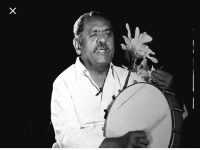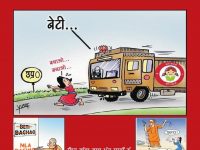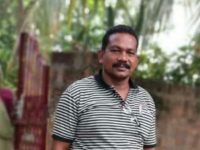Ideology in social life for human beings is as important as oxygen for life. The shared beliefs and values common to social communities are part of the intangible culture of the given social communities. These social beliefs and values sometimes need to be questioned and even challenged. When they are challenged, it becomes uncomfortable for the vested interests linked to the ruling classes in the society. These vested interests linked to the economically powerful sections of the society act in their service to effectively propagate and mould the social thought system of the society. Communal sectarianism is on the rise in our country. This phenomenon has paid rich electoral dividends to a section of ruling classes. They are doing everything to boost and defend this way of thinking in our society.
CPI leader Govind Pansare (popularly called as Com. Pansare) had embarked on the path of confronting this phenomenon. He challenged the myths floated and lies told about the social and political history of Maharashtra. His murder by unknown hitters who fired bullets on him and his wife Uma Pansare was a reaction to his bold mission to challenge the obscurantist notions prevailing in the society and his opposition to the political patrons upholding those values. In the book by the title ‘Who was Shivaji’ he gave an alternate narrative about the most iconic figure in the social and political history of Maharashtra. He wrote in this book, “Those who are using Shivaji in order to obtain people’s consent will have to answer for this historical truth. If there are any buyers for their hatred for Islam they should sell it on their own merit. They should not sell their commodity in Shivaji’s name. They should not sell that commodity under the brand of Shivaji. At the same time, the Muslims should not equate Shivaji with his image created by these so-called Shivabhaktas. They should look at history; they should appreciate his attitude to Islam religion. Then only they should make their opinion.” The book originally published in 1984, sold more than 150,000 copies with 24 editions in Marathi. It was also translated in Kannada, Urdu, Gujarati, English and Hindi.
Pansare had launched an aggressive campaign to expose the Modi government ever since it came to power in May last year. His continuous and systematic exposure of the historically regressive role of Nathuram Godse was being well appreciated by people in general and also a sizable sections of the academic community in particular. He countered the propaganda that Gandhi was killed by Hindu fanatics because he was responsible for the partition of India and had pressurized the Indian Government to dole out a sum of Rs. 50 crores to Pakistan. He pointed out that Narayan Apte, who was a participant in the murder of Gandhi in 1948, had also attempted to kill Gandhi in a bomb attack way back in 1934 when there was not even a demand for Pakistan. In 1934 during Gandhi’s tour against untouchability, while proceeding towards Muncipal hall in his car at Pune, a bomb was thrown by these fanatics at Gandhi’s car but it was a failed attempt . Pansare recounted another attempt by Nathuram Godse to kill Gandhi in a knife attack in 1944 at Panchgani in Satara district of Maharashtra. He thus exposed the pseudo Hinduist claim that Gandhi was a victim of his pro Pakistani stance. His extensive campaign throughout Maharastras towns and cities under the banner of Annabhau Sathe Sahitya Sammelan was effective in propagating a scientific, logical and rational way of thinking in opposition to the new wave of obscurantism and religious sectarianism.
Com. Pansare was born in a village named Kolhar in Ahmednagar District of Maharashtra. His parents had lost land to the money lenders during his childhood. His mother worked as a farm hand and his father as a handy man. His first brush with the social movement came through his association with the Rashtriya Seva Dal in his village. He was very young at that time. Later, yet in his school days he got introduced to the communist party. He finished his school education and then moved to Kolhapur for his higher education. He worked there as a newspaper vendor and a peon in the beginning. Later on in life he practiced labour law and was the president of the Bar Association for many years. He was very active on the labour front. He taught at the Shivaji University at Kolhapur as an associate professor. He had worked as a member of the National Control Commission of the CPI and also as state secretary of the party. During his participation in the Samyukta Maharashtra Movement, Goa freedom struggle and other political struggles he was jailed many a times. Over a period of time he became widely known for his sharp criticism of the right wing forces in the country and the socially regressive practices in our society.
As he went about with his aggressive campaign against the pseudo-Hindu outfits and their outdated program of the so called Hindu Rashtra, he received continuous threats from that section which now stands emboldened by the recent electoral success of the BJP. He did not care about it. Kolhapur city of Maharashtra is well known for its past King Shahu Maharaj who is known for progressive social reforms in the social history of the state. Com. Pansare chose to speak about his tradition and its relevance to the present day social scenario. He wrote a book about it which was well received and his interpretation of the relevance of the iconic Shahu Maharaj projected the Hindu bigots on the opposite side of the social discourse of Shahu Maharaj.
In the recent elections in Maharashtra, BJP won a stunning victory in the district defeating the traditional leaders of the Maratha lobby from the Congress and NCP. BJP has got this opportunity of ruling the most powerful Maratha lobby of Western Maharashtra for the first time in the history. The cadres from the right wing Hindutvavadi forces who ensured this victory were becoming increasingly disturbed by people’s growing acceptance of Com. Pansare’s ongoing campaign for rational and scientific interpretation of history and the need for progressive changes in the society. In the recent past, there was an attempt in western Maharashtra to incite a riot like situation by circulation of posts on ‘whats-ap’ demeaning the iconic figures of political significance in the state. Com. Pansare was a prominent leader among those who had successfully averted the crisis. This success again disturbed the comfort zone of the locally regressive forces backed by the powerful vested interests in the area.
In a meeting held in Kolhapur district on 13 January 2015 he spoke on the subject ‘Murder of Dr. Narendra Dabholkar and Rationalist Movement,’ Hindu Janjagran Samiti had openly warned Pansare against any critque of the Snatan Sanstha and other so called Hindutva outfits. Hindu Jana Jagruti Samiti had lodged a police complaint about the program in advance and the police too had warned Pansare to desist from mentioning the so called Hindutva organizations in his speech. These right wing organizations had threatened to stage demonstrations at the venue of that meeting and they congratulated the Police in the state for its co-operation. Com. Pansare however did not pay any heed to the threats. People in the area say that this could have been one of the important triggers for the cowardly attack that followed later.
However one more reason that could have provoked the murderous attack could have been his latest attempts to initiate public discussion on the book written by retired Police Officer Shamsuddin Mushriff about the killing of Hemant Karkare the late Chief of Maharashtra State anti-terror squad. In October 2008 the ATS had arrested alleged Hindu terrorists, including a VHP leader Sadhvi Pragya Singh Thakur , Swami Amritanand alias Dayanand Pandey, a retired Major Ramesh Upadyay and a serving Army officer Lt. Col. Prasad Shrikant Purohit. Karkare was heading these investigations and this fact is mentioned in this book by the title ‘Who killed Karkare?’ The fanatic Hindu organizations were upset about the attempt at linking the Karkare’s killing to his role in investigation of the above mentioned accused. Pansare had organized a meeting to discuss the book on which retired Justice B.G. Kolse Patil had also spoken. There was an agitation by the pseudo-Hinduists to cancel this discussion. Pansare received threatening letters from Pune after the program.
The police are investigating few local municipal corporators linked to the builders lobby for their role because Pansare held a brief against the builders in a few cases. They are also investigating from the angle that Com. Pansare’s role in the agitation against the toll in the city of Kolhapur could have instigated the attack. This may be an attempt to divert the investigations from the right track but even if it turns true, one cannot rule out the role of the extreme right wing Hindutvavadi forces in the murder of Com. Pansare. The present Chief Minister of Maharashtra expressed grief over the death but was hesitant to pay condolences in the house to Com. Pansare. When Narendra Dabholkar was killed Present CM was in the opposition and he had then demanded the resignation of the Home Minister for the failure in nabbing the culprits. Now he himself is in charge and we neither have the culprits in the Dabholkar case arrested nor is there any progress in the investigation of the Pansare murder case.
The very fact that the regressive forces in the state had to resort to murders to stop the spread of the progressive thoughts propagated by Com. Pansare and Dabholkar, shows their inability to deal with the issues raised by the two on the ideological plane. These murders have in fact given more exposure to the progressive role played by these activists. It has also helped to bring about a larger realignment of the progressive sections against the new wave of saffronization in the state. Thoughts cannot be defeated by physical attacks but at the same time progressive movement has to take the task of defending its own rank and file from such attacks seriously too. In the present circumstances it is necessary to continue campaigning on the issues touched upon by Com Pansare especially, that of de-mystyfying Nathuram Godse and encouraging discussions on the book ‘Who killed Karkare?’ If these two actions of Com. Pansare could have triggered his murder then we all should take this campaign seriously because carrying forward the progressive campaign unleashed by him will be a real service to the cause for which he paid by his life.


